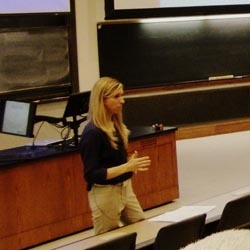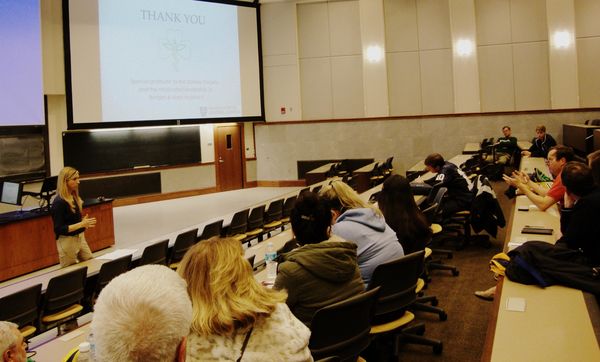

This past Saturday (Nov. 2) Keri Oxley, M.D., M.P.A., a 2004 Notre Dame graduate in preprofessional studies and philosophy, gave a presentation organized by a group of Notre Dame medical alumni in the Jordan Hall of Science called, "Suffering Transfigured: Insights into Personalisms in the Doctor-Patient Relationship."
Dr. Oxley, a Yale School of Medicine graduate and current resident in psychiatry at Massachusetts General Hospital, shared insights on doctor-patient relationships, particularly when it comes to dealing with death, from her experiences working with patients both nationally and abroad.
“With all of these biomedical breakthroughs, are we as a country actually missing a critical ingredient when it comes to dealing with suffering?” Dr. Oxley asked. Throughout the presentation, she focused on this question as well as the idea that although the U.S. may be biologically equipped, it may not be existentially equipped.
While in medical school, Dr. Oxley spent time abroad working in a medical center in Kolkata, India. Her experiences allowed her to view her relationships with patients who are near death in a different way. One day when she was actively tending to every patient in the medical center, quickly handing out supplies and doing everything she could to help, the head nun in the center stopped her and assigned her to sit with a patient who was near death.
“I allowed myself to grasp the reality of [the patient’s] suffering,” she explained. “She embraced me and comforted me before she died. At that moment in her embrace, I felt there was something beyond all of this activity, beyond the duties I was consumed with. Dying in its essence is not a medical act, but a human experience.”
After coming back to the U.S., Dr. Oxley recalled that Mother Teresa would always send her “best nuns to the U.S., because it was the poorest country in the world.”
“As I dove back to medical school at Yale, all these realities became obvious. As a culture we are prone to gravitate towards two responses when it comes to suffering; we are either hasteners or prolongers,” she said.
Dr. Oxley also presented data and shared experiences to emphasize what medicine seems to be missing — a broader, personal understanding of illness.
Towards the end of the presentation, Dr. Oxley invited her audience to write down experiences of failures that have led to some other success. She later connected these responses to illustrate that suffering can ignite human flourishing, and that perhaps that flourishing can happen up until a patient’s last moment of life.
“Medicine itself is a paradox; it’s a universal field that is scientific but very particular to the individual. It is finite, but tries to fulfill this infinite need. We have these paradoxes within our lives every time. This same phenomenon can extend until the end of life,” Oxley said as she closed her speech.